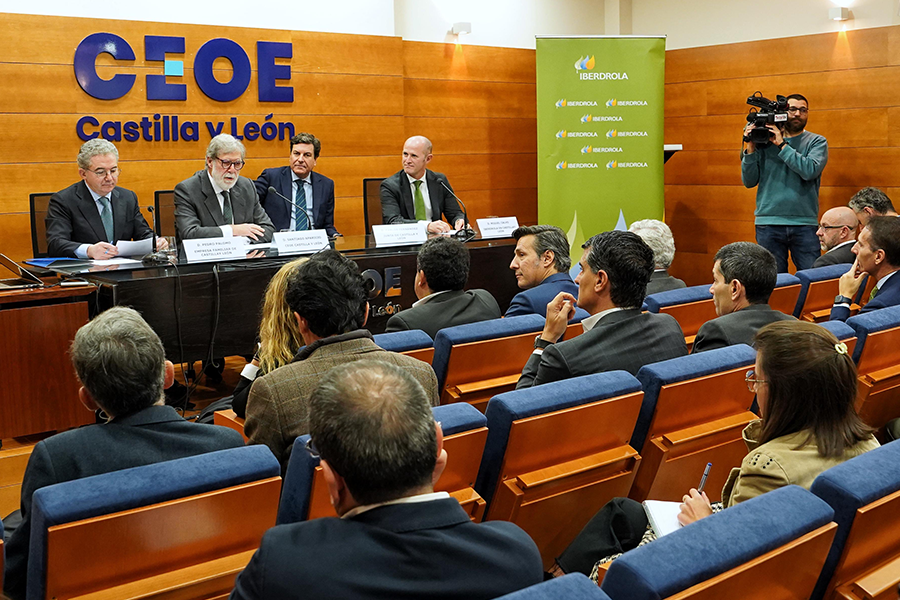Iberdrola España, CEOE Castilla y León and EFCL promote decarbonisation in industry
- More than a hundred representatives of companies and other entities of the community have attended a conference held today in Valladolid, where different options to advance in this process have been presented.
- Decarbonising industry through electrification is essential to tackle climate change, use energy more efficiently and foster innovation.

The president of Empresa Familiar de Castilla y León, Pedro Palomo, the president of CEOE Castilla y León, Santiago Aparicio, the Minister of Economy and Finance of the Junta de Castilla y León, Carlos Fernández Carriedo, and the delegate of Iberdrola in Castilla y León, Miguel Calvo.
Iberdrola España, CEOE Castilla y León and Empresa Familiar de Castilla y León (EFCL) today held a conference in Valladolid to promote decarbonisation Enlace externo, se abre en ventana nueva. in the industrial sector, which was attended by nearly a hundred representatives of companies and other entities in the community and which presented different options to advance this process.
Enlace externo, se abre en ventana nueva. in the industrial sector, which was attended by nearly a hundred representatives of companies and other entities in the community and which presented different options to advance this process.
The Minister of Economy and Finance of the Junta of Castile and León, Carlos Fernández Carriedo, explained that decarbonisation poses three challenges for companies through energy self-consumption: "firstly, because of the reduction in energy supply costs that allows them to increase their competitiveness; secondly, because they ensure their own energy supply with their own installations; and thirdly, because they can obtain a green certification that is essential for accessing some international markets".
For his part, the president of CEOE Castilla y León, Santiago Aparicio, explained how "from the Business Organisations we support companies on this arduous path of decarbonisation, based on the conviction that the energy transition of companies must be compatible with the improvement of production and the level of competitiveness". However, he pointed out that "this path is a challenge for our companies, which need not only a suitable framework to develop their business activity, but also support to be able to undertake the important investments that this ecological transition entails".
"The decarbonisation of industry through electrification is essential to tackle climate change, use energy more efficiently and promote innovation. For every euro invested in renewables, one euro must be invested in electricity grids," said Iberdrola España's delegate in Castile and León, Miguel Calvo. In fact, Calvo believes that it is necessary to increase investment in grids to be able to integrate new renewable power, offer security of supply and resilience in the face of extreme weather phenomena and to be able to develop the digitalisation of the system, so necessary for the expansion of electric mobility, self-consumption and the electrification of heat in industry.
Likewise, the president of Empresa Familiar de Castilla y León, Pedro Palomo, highlighted in his speech the firm commitment of family businesses to sustainability Enlace externo, se abre en ventana nueva. and their commitment to the more efficient use of energy resources, although he insisted on the need for greater incentives and administrative simplification to make it easier for companies to implement all those environmentally friendly processes that contribute to increasing their competitiveness.
Enlace externo, se abre en ventana nueva. and their commitment to the more efficient use of energy resources, although he insisted on the need for greater incentives and administrative simplification to make it easier for companies to implement all those environmentally friendly processes that contribute to increasing their competitiveness.
"The PERTE for industrial decarbonisation is a good opportunity for our companies to face the challenge of sustainability, but its success depends on its funds reaching the company efficiently, without drowning us in bureaucracy and aimed at financing the projects we need to tackle the green transition", he said.
Experiences
Five leading companies in Castile and León that are committed to sustainability: Campofrío, Verescence, DSSmith, Abadía Retuerta and Huercasa have described their different success stories on their way to decarbonisation.
Jorge Sanz, energy consultant and former president of the Commission of Experts on Energy Transition, addressed the need to reduce the dependence of industries on fossil fuels and shared the objectives and opportunities opened up by the European Commission's Green Deal Industrial Plan.
Decarbonisation of industry through renewable energies
Decarbonising industry through electrification is essential to tackle climate change, use energy more efficiently and foster innovation. This is a crucial step towards a more sustainable and resilient future.
A large part of industry's energy needs comes from so-called industrial heat, which is used in industrial processes. Heat is needed for a wide range of industrial applications, such as heating fluids, generating steam, carrying out chemical reactions, drying materials, melting metals or heating facilities. In addition, because of its wide variation of applications, industrial heat often requires different temperature levels and heat quantities, depending on the specific needs of each process.
Historically, fossil fuels such as natural gas, oil and coal have been used to generate this heat in boilers and industrial furnaces. However, the growing focus on sustainability and the quest to reduce greenhouse gas emissions means that industry is increasingly looking to renewable and more energy-efficient sources of heat. There is no doubt that the decarbonisation of industry through electrification is fundamental to progress in the fight against climate change.
In addition, electrification allows for a more efficient use of energy while enabling the implementation of more advanced control and monitoring technologies, resulting in more accurate and efficient management of industrial processes.
